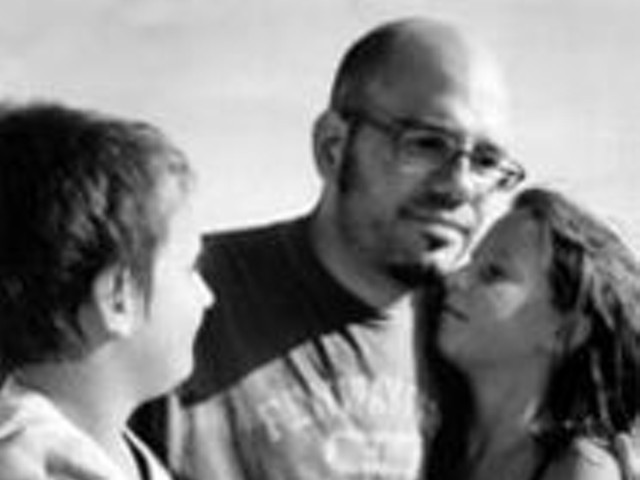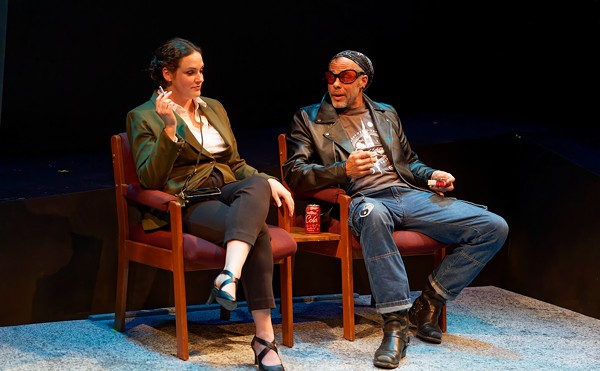Ever since his historic solo flight from New York to Paris 75 years ago, Charles Lindbergh has been infuriatingly difficult to pin down. No play, movie or opera has been able to fully capture Lindbergh's complexity -- or the significance of his achievement. Perhaps this 45-minute production from the Metro Theatre Company is so intriguing because it doesn't try to define him. Its ambitions are even loftier, for it instead seeks to convey the mystical aura that spurred the shy pilot to immortality.
Lindbergh is enacted by three performers (Nicholas Kryah, Christopher Mannelli and Nathan Ruyle). Like a relay team whose runners take turns passing the baton, these three alternate in wearing Lindbergh's signature aviator's cap. Whoever has it on at a given moment is Lindbergh. Through these three (and thanks to a versatile, abstract steel-frame set, strikingly lit by John Wylie), we traverse the Atlantic Ocean; we land in Paris. Along the way, we share the young pilot's euphoria at daring the elements, and we experience his exhaustion while flying nonstop for 33 hours. But this is not a simplistic Horatio Alger story. When Lindbergh refers to "flying the clouds to shreds," with a twinge of sadness we know that all too soon aviation will strip the sky of its wonder.
Five years ago, Metro artistic director Carol North first saw this piece performed by a Dutch company in the Netherlands. Captivated by its originality, she brought it to America in time to enhance the celebration of the flight's 75th anniversary. Although the Metro Theatre Company is touring this piece to Florida and New England, it will never enjoy a more fitting venue than at the Missouri History Museum, where a copy of the Spirit of St. Louis hangs from the foyer ceiling and a remarkable Lindbergh exhibit is on display.
Nothing will douse this play's magic more quickly than inflated expectations, so I don't want to overhype the piece. But at its very least, it is unconventional theater. If you allow yourself to be captivated by its idiosyncrasy, the production can take you on an enthralling flight of fancy. The Metro Theatre Company is billing this engagement as a "family performance." Exactly right. Captain Lindbergh's Ocean Flight is family theater that speaks to the child who resides in us all.
"I'm a big laugh whore," playwright/ screenwriter Paul Rudnick (Jeffrey, In & Out) once told an interviewer. "So when I write anything, I always think, is this going to be funny?" Rudnick doesn't have to worry about his 1998 off-Broadway comedy The Most Fabulous Story Ever Told. It is very funny indeed, sometimes riotously so.
Rudnick wrote this play in response to the gay-bashing fundamentalist-Christian saying "God made Adam and Eve, not Adam and Steve." The premise here is simple: What if God had indeed created Adam and Steve? And what if, instead of those problematic brothers Cain and Abel, he (or is it she?) had made Jane and Mabel? When the play begins in the Garden of Eden, the immediate concern is that it will become a one-trick pony. (How many banana jokes can you think up?) But as the plot moves on to chronicle Noah's ark and Moses (now named Brad), the comedy picks up speed. Its irreverent spin on biblical writ is laugh-in-your-face reminiscent of Mel Brooks' History of the World, Part 1 -- with, of course, a gay agenda.
Act 2 moves the story forward 2,000 years to the present. On Christmas Eve, our four protagonists are coping with their insular lives in contemporary New York City. Adam is a teacher who has just staged a gay Christmas pageant. Jane, in a good-natured parallel to the virgin birth, is pregnant with an artificially inseminated child (Adam's, of course). Quips, gags and one-liners tumble from the stage like the contents of a holiday cornucopia -- right up until the end, when Rudnick tacks on an arbitrary and unnecessary AIDS plot. But by then, the comedy has so effectively espoused its gospel of tolerance, one can overlook this structural flaw and the play's unhappy lapse into didacticism.
Director Ted Gregory keeps this Hothouse Theatre Company production moving like a house on fire (or even a burning bush) -- which is all to the good, because despite its brisk pace, the two-and-a-half-hour run time feels long. Gregory is well served by an outstanding cast of comedic actors. Jeremy Sher as Adam and Michael Jokerst as Steve work beautifully together. If Sher and Jokerst could pass as brothers, Kim Furlow as Jane and Sarah Cannon as Mabel are more like Mutt and Jeff. Furlow is all bluster, Cannon demure charm. Among the spirited supporting cast, Terry Meddows makes the most of wonderful material as a gay pharaoh in Act 1 and a cynical gay Santa in Act 2. Lavonne Byers wisely underplays her paralyzed lesbian rabbi. (That's a character you don't see every day.)
I keep referring to The Most Fabulous Story Ever Told as a comedy, and of course it is. But Rudnick is more than a self-proclaimed laugh whore. Cushioned among all these wicked laugh lines is a tender, loving message -- as when, in the Garden of Eden, Adam avers, "If we're going to create the world, we have to respect our differences." Sad to say, I'm not sure this accomplished production will persuade the gay-bashers to reach for heightened compassion. They'd have to see it first. As Hamlet would say, "That's the rub."
What is the one essential attribute that any Shakespeare production needs must possess if it is to engage an audience? Clarity. A director can layer on anything he likes -- shift the time period or cast females in male roles -- but if the text is not clear, all those so-called improvements are for naught. On this score, the current Hamlet, which concludes the 2002 St. Louis Shakespeare season, is on solid ground.
This Hamlet is populated with straightforward, accessible performances. Christopher Hickey (who is emerging as one of the area's most reliable actors) is a properly restrained Horatio, Matt Kahler delivers a sympathetic Laertes and (as he did earlier this season in The Taming of the Shrew) Robert A. Mitchell emanates an understated authority, this time as the villainous King Claudius.
Best of all is Sara Renschen as the doomed Ophelia. Last year, in the title role of Christopher Durang's farce Betty's Summer Vacation, Renschen played a character who was required to project sanity in an insane world. Here she must succumb to insanity in a cruelly sane world. Once again she rises to the occasion. Although Ophelia's "mad" scenes often slow Hamlet to a maddening crawl, Renschen's reveals an intriguing method to her madness. Her calibrated descent is among the evening's highlights.
Alas, the problem here is with Hamlet himself. I say this cautiously, because no one who is not an actor should underestimate the herculean challenge of attempting Hamlet. It is the role of roles. Because the character is so ill-defined on the page and the performance options are so innumerable, Hamlet of necessity must become the Dane the actor chooses to make him. But in this production, one senses that Bryan Keith has yet to make any choices at all. He's a well-intentioned actor who knows his lines. But, although he goes through the motions, he's not yet capable of stroking our emotions. You might think, now that the production has opened, Keith's work is behind him. In fact, it is just beginning.
But, of course, it's impossible to see Hamlet and not have a rewarding time: Here an unexpectedly moving Ophelia, there a deftly executed fencing scene -- and always the joy of hearing anew resonant lines that we know like old friends. But during the three-hour play, I kept returning to the wistful thought that in this same 180 minutes I could have sat through Captain Lindbergh's Ocean Flight four times.





